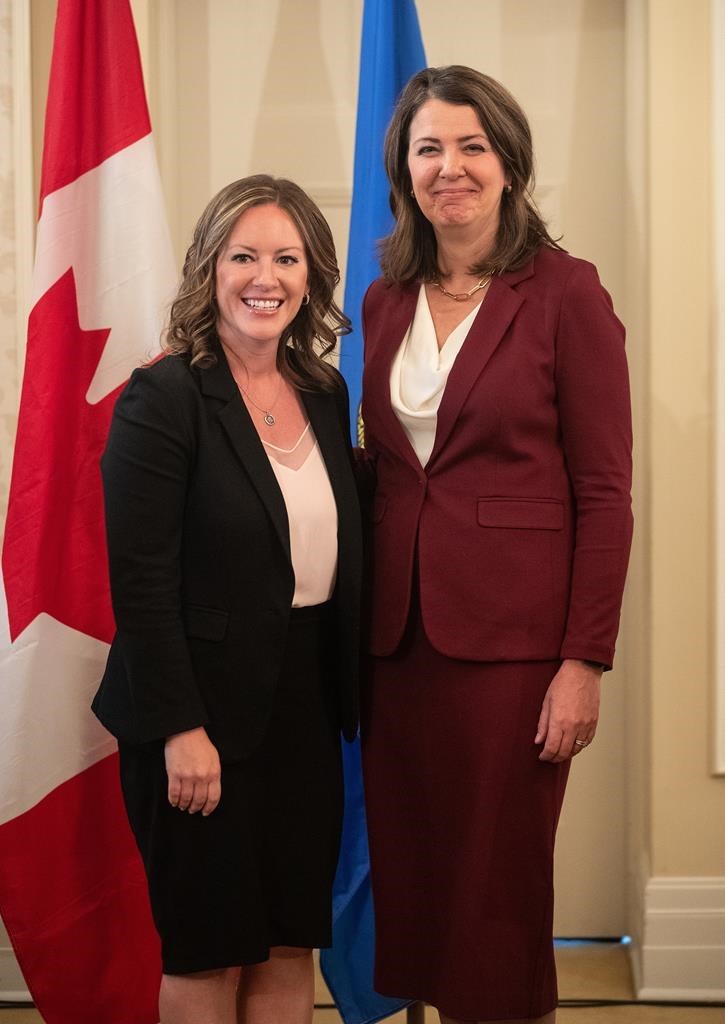EDMONTON — Alberta Premier Danielle Smith's direction to her new environment minister lacks specifics on climate change and does more to protect industry interests than ecosystems, critics say.
On Monday, Smith released the mandate letter to Rebecca Schulz, appointed minister in June. The letter gives Schulz 13 priorities, from developing regulations to safely release oilsands tailings into the environment to implementing the climate plan originally outlined in April.Â
But the letter also includes instructions to open up water licensing, streamline industrial reclamation, promote nuclear energy and oppose federal environmental regulation.Â
"There are some really critical pieces that are missing that Albertans should be concerned about," said Jodi Calahoo-Stonehouse, New Democrat environment critic.Â
One of them is any detail on the commissions, committees and studies promised by former minister Sonya Savage to determine how Alberta will achieve climate neutrality by 2050, plans that the government acknowledged even then were mostly "aspirational."
"They have failed completely," said Calahoo-Stonehouse. "There's nothing here."
Simon Dyer of the clean energy think tank the Pembina Institute agreed.
"The letter lacks a clear commitment to reduce emissions in the short term," he said. "It's impossible to be an energy and environmental leader without a clear plan to reduce emissions and Alberta doesn't have one."
There is no mention of policies on methane reduction, oilsands emission limits or encouraging renewable energy, although the letter refers to Alberta as "the most responsible energy producer and exporter on Earth."
"This self-congratulatory rhetoric is not helpful," Dyer said.Â
Schulz said specifics on the climate strategy, or Emissions Reduction and Energy Development Plan, are coming as soon as the government has a chance to gather enough information. That will take some months, she said.
"We are going down the path of actually doing the work. It is one of our top priorities.
"In many ways, we are working at emissions reduction right now," Schulz said. "Some aspects of our net-zero aspiration by 2050 are relying, maybe in some cases, on technology that doesn't yet exist." Â
Tara Russell of the Canadian Parks Wilderness Society points out the letter ignores protecting ecosystems or vulnerable species.
"The letter makes no mention of increasing the number of protected areas or advancing conservation of at-risk species — both actions Alberta urgently needs to take, and ones that polling clearly shows Albertans are supportive of," she wrote in an email.Â
Melody Lepine of the Mikisew Cree First Nation said she's encouraged Smith asks Schulz to work with First Nations in setting the rules for how oilsands tailings will be treated before being released into the Athabasca River, something the letter wants "accelerated."
But she's worried no mention is made of improving Alberta's environmental management, especially the land-use plan that governs the oilsands area.
"We … are not hearing that there will be significant changes to this weak plan that does very little in managing cumulative effects in our region. Promoting weak management systems won’t help increase our confidence."
Calahoo-Stonehouse gives the United Conservative government marks for promising to deal with oilsands tailings.
"It's too little, too late, but it's a start," she said.Â
But Calahoo-Stonehouse said the letter fails to provide permanent protection for the eastern slopes of the Rockies from industrial development.Â
She points out it proposes increasing water licences for municipalities, industry and agriculture.
"There are water issues down south and (the government) is not talking about addressing them in a sustainable way," Calahoo-Stonehouse said.Â
 Nor do those plans make any mention of First Nations water rights, she added.
The letter also tasks Schulz to "improve" and "streamline" the process for environmental reclamation certificates. Â
"There's a lack of a clear commitment to environmental protection," said Dyer.Â
Schulz said protecting the environment remains the department's focus.Â
"It permeates all of the work that we do," she said. "Whether you're talking about energy or water or land-use planning, that involves making sure we are putting aspects of sustainability and stewardship first and foremost."
This report by The Canadian Press was first published July 11, 2023.
Bob Weber, The Canadian Press




